BMW 2 Series vs Toyota C-HR – Differences & prices compared
Compare performance, boot space, consumption and price in one view.
Find out now: which car is the better choice for you – BMW 2 Series or Toyota C-HR?
The BMW 2 Series (Coupe) comes with a Diesel MHEV or Petrol engine and Automatic or Manuel transmission. In comparison, the Toyota C-HR (SUV) features a Full Hybrid or Plugin Hybrid engine with Automatic transmission.
When it comes to boot capacity, the BMW 2 Series offers 390 L, while the Toyota C-HR provides 447 L – depending on how much space you need. If you’re looking for more power, decide whether the 530 HP of the BMW 2 Series or the 223 HP of the Toyota C-HR suits your needs better.
In terms of consumption, the values are 4.90 L per 100 km for the BMW 2 Series, and 0.80 L for the Toyota C-HR.
Price-wise, the BMW 2 Series starts at 39200 £, while the Toyota C-HR is available from 29100 £. Compare all the details and find out which model fits your lifestyle best!
BMW 2 Series
The BMW 2 Series embodies a perfect blend of dynamic performance and sporty elegance, making it a popular choice among driving enthusiasts. With its impressive handling and sophisticated design, it captures the essence of a modern compact coupe. Inside, the 2 Series offers a luxurious and driver-centric cabin equipped with cutting-edge technology, ensuring both comfort and connection on every journey.
details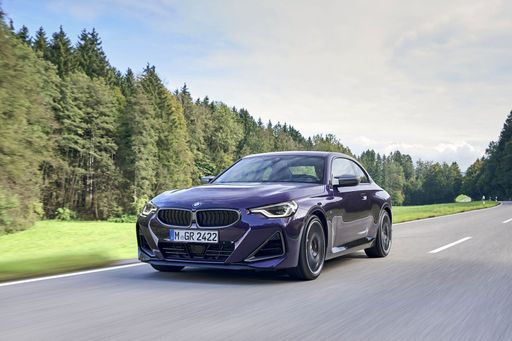 @ press.bmwgroup.com
@ press.bmwgroup.com
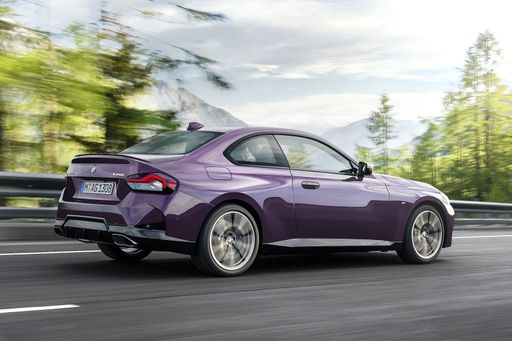 @ press.bmwgroup.com
@ press.bmwgroup.com
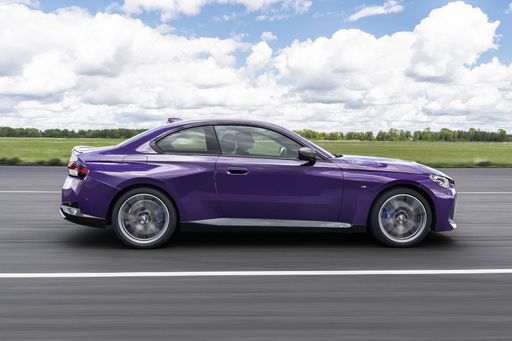 @ press.bmwgroup.com
@ press.bmwgroup.com
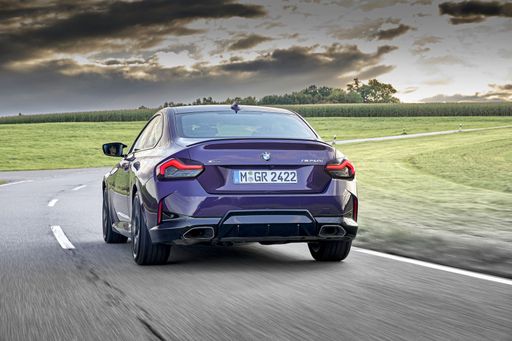 @ press.bmwgroup.com
@ press.bmwgroup.com
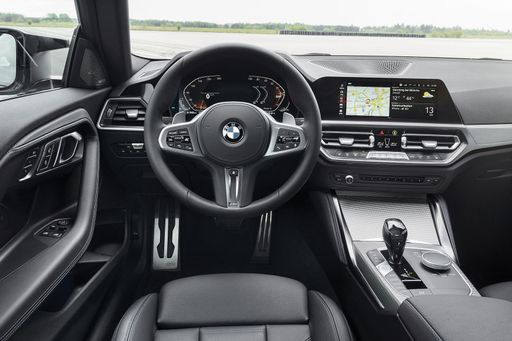 @ press.bmwgroup.com
@ press.bmwgroup.com
Toyota C-HR
The Toyota C-HR stands out with its distinctive and bold design that combines sleek, angular lines with a sporty posture. Its comfortable and stylish interior is equipped with advanced technology features, providing a seamless driving experience. The vehicle offers impressive handling and performance, making it a compelling choice for those who appreciate a blend of practicality and flair on the road.
details @ Toyota
@ Toyota
 @ Toyota
@ Toyota
 @ Toyota
@ Toyota
 @ Toyota
@ Toyota
 @ Toyota
@ Toyota

|

|
|
|
|
Costs and Consumption |
|
|---|---|
|
Price
39200 - 98600 £
|
Price
29100 - 42800 £
|
|
Consumption L/100km
4.9 - 10 L
|
Consumption L/100km
0.8 - 5.1 L
|
|
Consumption kWh/100km
-
|
Consumption kWh/100km
-
|
|
Electric Range
-
|
Electric Range
68 km
|
|
Battery Capacity
-
|
Battery Capacity
-
|
|
co2
129 - 226 g/km
|
co2
17 - 115 g/km
|
|
Fuel tank capacity
51 - 52 L
|
Fuel tank capacity
43 L
|
Dimensions and Body |
|
|---|---|
|
Body Type
Coupe
|
Body Type
SUV
|
|
Seats
4
|
Seats
5
|
|
Doors
2
|
Doors
5
|
|
Curb weight
1560 - 1805 kg
|
Curb weight
1505 - 1755 kg
|
|
Trunk capacity
390 L
|
Trunk capacity
350 - 447 L
|
|
Length
4537 - 4587 mm
|
Length
4362 mm
|
|
Width
1838 - 1887 mm
|
Width
1832 mm
|
|
Height
1390 - 1404 mm
|
Height
1558 - 1564 mm
|
|
Payload
350 - 400 kg
|
Payload
375 - 425 kg
|
Engine and Performance |
|
|---|---|
|
Engine Type
Diesel MHEV, Petrol
|
Engine Type
Full Hybrid, Plugin Hybrid
|
|
Transmission
Automatic, Manuel
|
Transmission
Automatic
|
|
Transmission Detail
Automatic Gearbox, Manual Gearbox
|
Transmission Detail
-
|
|
Drive Type
Rear-Wheel Drive, All-Wheel Drive
|
Drive Type
Front-Wheel Drive, All-Wheel Drive
|
|
Power HP
156 - 530 HP
|
Power HP
140 - 223 HP
|
|
Acceleration 0-100km/h
3.8 - 8.7 s
|
Acceleration 0-100km/h
7.4 - 9.9 s
|
|
Max Speed
224 - 302 km/h
|
Max Speed
175 - 180 km/h
|
|
Torque
250 - 650 Nm
|
Torque
-
|
|
Number of Cylinders
4 - 6
|
Number of Cylinders
4
|
|
Power kW
115 - 390 kW
|
Power kW
103 - 164 kW
|
|
Engine capacity
1995 - 2998 cm3
|
Engine capacity
1798 - 1987 cm3
|
General |
|
|---|---|
|
Model Year
2024 - 2025
|
Model Year
2024 - 2025
|
|
CO2 Efficiency Class
D, G, E
|
CO2 Efficiency Class
C, B
|
|
Brand
BMW
|
Brand
Toyota
|
BMW 2 Series
The New BMW 2 Series: A Symphony of Performance and Style
The BMW 2 Series is more than just a luxury vehicle—it's a testament to the innovation and engineering prowess of the BMW brand. With its classic coupé silhouette and the signature kidney grille, the 2 Series models strike a balance between athleticism and elegance. The 2024 line-up offers a variety of versions, each tailored to meet different performance and efficiency needs, making it an impressive contender in the compact coupe segment.
Engine and Performance Specifications
Under the bonnet, the BMW 2 Series showcases a range of engine choices, from the petrol-powered 218i to the high-performance M2, delivering an astounding 480 PS with a manual rear-wheel drive. The power spectrum stretches from 156 PS to 480 PS, catering to both those who prioritise fuel efficiency and those who crave unadulterated power.
The coupé offers both petrol and advanced diesel mild-hybrid options. The petrol engines range from a frugal 6.4 L/100 km to a sportier 10 L/100 km for the M2 variant, ensuring an efficient yet exhilarating drive. Meanwhile, the diesel options optimise consumption with an impressive 4.9 L/100 km, making it an attractive choice for eco-conscious driving enthusiasts.
Innovations and Technology
Technological innovation is at the core of the BMW 2 Series. The integration of an advanced automatic transmission system ensures smooth and precise gear shifts, enhancing the driving experience significantly. Adding further allure is the optional all-wheel-drive system, available on selected models, providing unparalleled stability and traction in diverse driving conditions.
Moreover, the 2 Series is equipped with cutting-edge safety and driver assistance systems. Included are features like lane departure warning, adaptive cruise control, and the intuitive BMW iDrive system, which integrates seamlessly with your digital lifestyle to deliver real-time information and entertainment.
Elegant Design and Aerodynamics
The aesthetics of the BMW 2 Series go beyond mere appearance; they incorporate functional design elements that optimize aerodynamic performance. This is manifest in the sleek lines and contours that not only enhance its visual appeal but also contribute to improved fuel efficiency and handling.
Inside, the vehicle offers a symphony of elegance and technology with premium materials and refined finishes. The interior is crafted to provide optimal comfort, ensuring a luxurious experience for all four seats. Ample space remains a highlight with 390 litres of boot capacity, making it practical for both everyday commutes and weekend getaways.
Conclusion: Driving Pleasure Redefined
The 2024 BMW 2 Series embodies the quintessential spirit of driving pleasure. From the roaring power of the M2 to the refined efficiency of the diesel mild-hybrid variants, the model range caters to a diverse audience, each demanding the extraordinary precision and dynamic performance that BMW is renowned for. With starting prices ranging from €45,300 to €77,100, the 2 Series accommodates both enthusiasts and purists alike, reaffirming BMW's commitment to innovation and the timeless allure of driving.
Toyota C-HR
Revolutionising the Crossover Segment: The Toyota C-HR
The Toyota C-HR has firmly established itself as a standout contender in the compact crossover segment. Known for its distinct design and hybrid capabilities, the C-HR continues to prioritise innovation and efficiency. In this article, we delve into the technical details that make the 2024 iteration a compelling choice for discerning buyers.
Distinctive Design and Aerodynamics
The Toyota C-HR boasts a striking design that combines angular lines with modern aesthetics. This isn't merely for show; the design enhances aerodynamics, improving fuel efficiency and handling. With dimensions of 4362mm in length and a sophisticated structure, the C-HR strikes a balance between urban agility and on-road stability.
Impressive Hybrid Powertrains
The C-HR lineup offers innovative hybrid and plug-in hybrid drivetrain options. The full hybrid system is tailored for those who seek both economic and environmental benefits. It combines a petrol engine with an electric motor to deliver power outputs ranging from 140 to 223 PS, achieving remarkable fuel consumption rates from 0.8 to 5.1 L/100km. The 2.0 Plug-In Hybrid variant impresses with an electric range of 67 km, ideal for urban commuters.
Unmatched Efficiency and Performance
Acceleration figures for the C-HR range from 7.4 to 9.9 seconds to reach 0-100 km/h, ensuring a responsive driving experience. Maximum speeds between 175 and 180 km/h cater to those who appreciate a bit of zest on the open road. Coupled with CVT automatic transmission and both front-wheel and all-wheel-drive configurations, the C-HR adapts to various driving conditions with ease.
Advanced Technology and Features
Inside, the C-HR is equipped with the latest technology aimed at providing connectivity and comfort. The model hosts an array of features across its diverse trim levels, including Business Edition, Lounge, and the sporty GR SPORT. Each variant is designed to meet the demands of different lifestyles, ensuring there's a C-HR model to suit every taste.
Sustainability and Cost Efficiency
With CO2 emissions ranging from 19 to 115 g/km, the C-HR stands as a testament to Toyota's commitment to sustainability. Financially savvy consumers will also appreciate the running cost, with monthly expenses from €959 to €1204, and a cost per km as low as 38.4 cents. Such efficiency makes the vehicle an attractive option for eco-minded buyers.
Conclusion: A Forward-Thinking Choice
The 2024 Toyota C-HR embodies Toyota's forward-thinking approach to automotive innovation, blending eco-friendly hybrid technologies with stylish design and practicality. It offers a glimpse into the future of driving, where efficiency meets elegance. Whether you're a city dweller or an adventure seeker, the C-HR promises a driving experience that is both enjoyable and environmentally conscious.
The prices and data displayed are estimates based on German list prices and may vary by country. This information is not legally binding.
